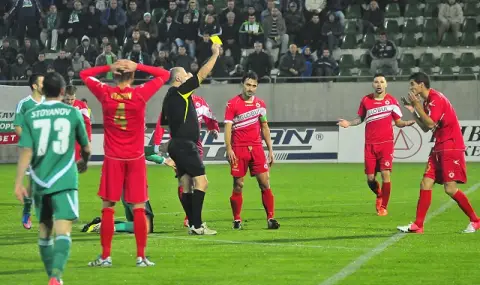German researchers suggest that referees punish footballers who are taller than them. The theory is based on the Napoleon complex, but remains highly controversial.
Ambush? Fal? Hand game? In football, there are always contested refereeing decisions. That is why in professional football there is a head referee who is supported by three others. In order to avoid wrong decisions, there is also a video assistant referee who watches the disputed situations on a screen - from a different angle and in slow motion.
Although the judge does not make decisions alone, some seem very controversial indeed. This is because the referee has a relatively large freedom of action in football.
Elevation compensation?
German researchers have analyzed the relationship between the height of referees and football players - just in time for the European Championship. According to their preliminary publication, which has not yet been peer-reviewed, shorter referees penalize taller footballers more severely to compensate for their perceived physical superiority.
Aha, maybe some football fans are thinking, so it is! Fair and objective, another time! Clearly a wrong decision, just because the judge has a complex! But whether there really is any truth to this thesis will only become clear when this preliminary publication is subjected to scientific analysis.
10% higher chance to award a violation
For the purpose of the study, researchers Dr. Hendrik Zonabend and Giulio Callegaro from the University of Hagen together with Mario Lackner from the "Johannes Kepler" in Linz analyzed data from the German Bundesliga between 2014 and 2021 and looked at more than 2,340 matches. So research work can be a lot of fun too!
So they concluded that a shorter referee was more likely to call a foul or show a yellow card to a taller player. "The likelihood of a harsher foul being called is 10 percent higher when the players are significantly taller than the referees than if they are relatively the same height,” says Zonabend.
According to the researchers, the so-called Napoleon's complex can be clearly traced already in the first half of the matches. ”It is obvious that punishments are used to demonstrate power. If they fail to do this through physical dominance, the judges punish them with power," Zonabend said. In the second half, the "harsher" penalties, such as yellow cards, decrease. "This is perhaps due to the fact that the players have noticed that the referee is quick to punish infringements,", suspects Hendrik Zonabend.
The Little Great Emperor
The Napoleon complex, however, is too controversial in psychology. The theory is that shorter people, especially men, are more likely to behave aggressively or dominantly to compensate for their height. Already in 2023, a study of this complex shows that all attempts at compensation are not so much related to the actual size of the body as to the desire to be taller. According to a study from Padua, people who wish they were taller usually have narcissistic or manipulative traits.
The theory is named after the French emperor Napoleon Bonaparte. The misconception of the alleged "little emperor" however, it is based on a miscalculation. In fact, at 169 cm tall, Napoleon was of average to above average height for his time.
At the same time, according to the preliminary publication, the opposite trend is also observed in sports: smaller players are penalized 16% less than players of similar height to the referee.
Lessons from sports for professional life in general?
Scientific review will show whether this preliminary publication can actually be substantiated. Hendrik Zonabend actually conducts research in labor economics and behavioral economics. In his opinion, the observations in sports can be partially transferred to our behavior in everyday life or at the workplace.
Hagen researchers believe that height prejudice is also widespread in boardrooms, application procedures and job evaluations. And this bias also affects career opportunities, promotions, and day-to-day professional life.
However, authority can be created not only through punishments, but above all through clear messages and appropriate body language. And according to the researchers, the assessment - whether in everyday work or in football - should always be fair and not be distorted by other characteristics such as likeability or height.
